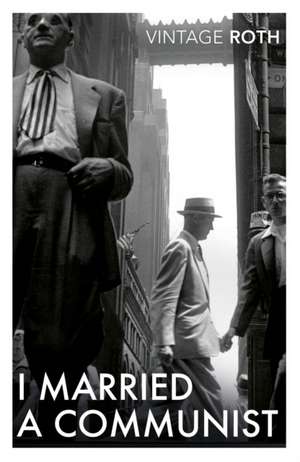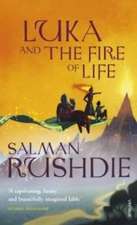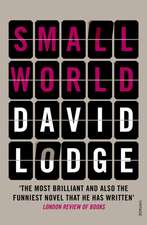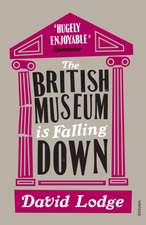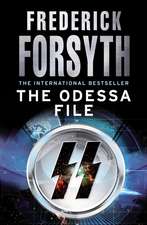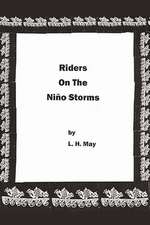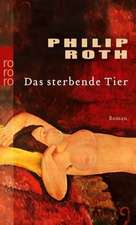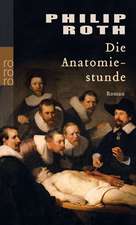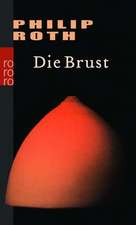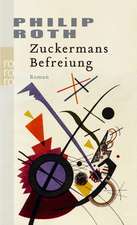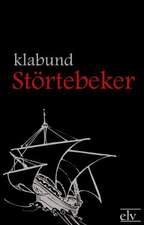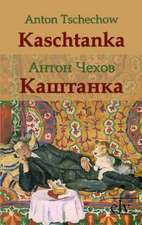I Married a Communist
Autor Philip Rothen Limba Engleză Paperback – aug 2019
| Toate formatele și edițiile | Preț | Express |
|---|---|---|
| Paperback (3) | 53.91 lei 26-32 zile | +20.34 lei 10-14 zile |
| Random House – iul 1999 | 53.91 lei 26-32 zile | +20.34 lei 10-14 zile |
| Vintage Publishing – aug 2019 | 54.22 lei 26-32 zile | +20.85 lei 10-14 zile |
| Vintage Books USA – 31 oct 1999 | 104.07 lei 6-8 săpt. |
Preț: 54.22 lei
Preț vechi: 64.04 lei
-15% Nou
10.37€ • 10.86$ • 8.58£
Carte disponibilă
Livrare economică 20-26 martie
Livrare express 04-08 martie pentru 30.84 lei
Specificații
ISBN-10: 1784875554
Pagini: 352
Dimensiuni: 132 x 194 x 32 mm
Greutate: 0.27 kg
Editura: Vintage Publishing
Recenzii
"A remarkable work—remarkable in its stringent observation of American life...remarkable in its wisdom. Mr. Roth has the frantic politics of this frantic time—the McCarthy era—in exact pitch." —Arthur Schlesinger, The New York Observer
"As social history it bbreathes life. In Ira Ringold, Roth has created one of his singularly ripe, vigorous characters. Ira's dizzying rise and fall out of and back into the working class trace the trajectory of twenty years of American history." —Todd Gitlin, Chicago Tribune
"Philip Roth is an amazing writer.... I Married a Communist may very well become his classic work; perhaps a classic for all time."--The Plain Dealer
"Gripping.... A masterly, often unnerving, blend of tenderness, harshness, insight and wit."--The New York Times Book Review
"I Married a Communist is filled with passages as fine and sharp as anything Roth has ever written (which is to say, as fine and sharp as anything in contemporary American literature)."--The Village Voice Literary Supplement
"I Married a Communist leaves you--both dumbfounded and in awe."--Chicago Sun-Times
"[S]eals [Roth's] reputation as a writer at the very top of his game."--The Philadelphia Inquirer
Notă biografică
Extras
Ira Ringold's older brother, Murray, was my first high school English teacher, and it was through him that I hooked up with Ira. In 1946 Murray was just back from the army, where he'd served with the 17th Airborne Division at the Battle of the Bulge; in March 1945, he'd made the famous jump across the Rhine that signaled the beginning of the end of the European war. He was, in those days, a crusty, brash, baldheaded guy, not as tall as Ira but rangy and athletic, who hovered over our heads in a perpetual state of awareness. He was altogether natural in his manner and posture while in his speech verbally copious and intellectually almost menacing. His passion was to explain, to clarify, to make us understand, with the result that every last subject we talked about he broke down into its principal elements no less meticulously than he diagrammed sentences on the blackboard. His special talent was for dramatizing inquiry, for casting a strong narrative spell even when he was being strictly analytic and scrutinizing aloud, in his clearcut way, what we read and wrote.
Along with the brawn and the conspicuous braininess, Mr. Ringold brought with him into the classroom a charge of visceral spontaneity that was a revelation to tamed, respectablized kids who were yet to comprehend that obeying a teacher's rules of decorum had nothing to do with mental development. There was more importance than perhaps even he imagined in his winning predilection for heaving a blackboard eraser in your direction when the answer you gave didn't hit the mark. Or maybe there wasn't. Maybe Mr. Ringold knew very well that what boys like me needed to learn was not only how to express themselves with precision and acquire a more discerning response to words, but how to be rambunctious without being stupid, how not to be too well concealed or too well behaved, how to begin to release the masculine intensities from the institutional rectitude that intimidated the bright kids the most.
You felt, in the sexual sense, the power of a male high school teacher like Murray Ringold-masculine authority uncorrected by piety-and you felt, in the priestly sense, the vocation of a male high school teacher like Murray Ringold, who wasn't lost in the amorphous American aspiration to make it big, who-unlike the school's women teachers-could have chosen to be almost anything else and chose instead, for his life's work, to be ours. All he wanted all day long was to deal with young people he could influence, and his biggest kick in life he got from their response.
Not that the impression his bold classroom style left on my sense of freedom was apparent at the time; no kid thought that way about school or teachers or himself. An incipient craving for social independence, however, had to have been nourished somewhat by Murray's example, and I told him this when, in July 1997, for the first time since I graduated from high school in 1950, I ran into Murray, now ninety years old but in every discernible way still the teacher whose task is realistically, without self-parody or inflating dramatics, to personify for his students the maverick dictum "I don't give a good goddamn," to teach them that you don't have to be Al Capone to transgress-you just have to think. "In human society," Mr. Ringold taught us, "thinking's the greatest transgression of all." "Cri-ti-cal think-ing," Mr. Ringold said, using his knuckles to rap out each of the syllables on his desktop, "-there is the ultimate subversion." I told Murray that hearing this early on from a manly guy like him-seeing it demonstrated by him-provided the most valuable clue to growing up that I had clutched at, albeit half comprehendingly, as a provincial, protected, high-minded high school kid yearning to be rational and of consequence and free.
Murray, in turn, told me everything that, as a youngster, I didn't know and couldn't have known about his brother's private life, a grave misfortune replete with farce over which Murray would sometimes find himself brooding even though Ira was dead now more than thirty years. "Thousands and thousands of Americans destroyed in those years, political casualties, historical casualties, because of their beliefs," Murray said. "But I don't remember anybody else being brought down quite the way that Ira was. It wasn't on the great American battlefield he would himself have chosen for his destruction. Maybe, despite ideology, politics, and history, a genuine catastrophe is always personal bathos at the core. Life can't be impugned for any failure to trivialize people. You have to take your hat off to life for the techniques at its disposal to strip a man of his significance and empty him totally of his pride."
Murray also told me, when I asked, how he had been stripped of his significance. I knew the general story but little of the details because I began my own army stint-and wasn't around Newark again for years-after I graduated college in 1954, and Murray's political ordeal didn't get under way until May 1955. We started with Murray's story, and it was only at the end of the afternoon, when I asked if he'd like to stay for dinner, that he seemed to feel, in unison with me, that our relations had shifted to a more intimate plane and that it wouldn't be incorrect if he went on to speak openly about his brother's.
Out near where I live in western New England, a small college called Athena runs a series of weeklong summer programs for elderly people, and Murray was enrolled as a student, at ninety, for the course grandly entitled "Shakespeare at the Millennium." That's how I'd run into him in town on the Sunday he arrived-having failed to recognize him, I was fortunate that he recognized me-and how we came to spend our six evenings together. That's how the past turned up this time, in the shape of a very old man whose talent was to give his troubles not one second more thought than they warranted and who still couldn't waste his time talking other than to a serious point. A palpable obstinacy lent his personality its flinty fullness, and this despite time's radical pruning of his old athletic physique. Looking at Murray while he spoke in that familiarly unhidden, scrupulous way of his, I thought, There it is-human life. There is endurance.
In '55, almost four years after Ira was blacklisted from radio for being a Communist, Murray had been dismissed from his teaching job by the Board of Education for refusing to I cooperate with the House Un-American Activities Committee when it had come through Newark for four days of hearings. He was reinstated, but only after a six-year legal struggle that ended in a 5-4 decision by the state supreme court, reinstated with back pay, minus the amount of money he had earned supporting his family those six years as a vacuum salesman.
"When you don't know what else to do," Murray said with a smile, "you sell vacuum cleaners. Door to door. Kirby vacuum cleaners. You spill a full ashtray onto the carpet and then you vacuum it up for them. You vacuum the house for them. That's how you sell the thing. Vacuumed half the houses in New Jersey in my day. Look, I had a lot of well-wishers, Nathan. I had a wife whose medical expenses were constant, and we had a child, but I was getting a pretty good amount of business and I sold a lot of people vacuum cleaners. And despite her scoliosis problems, Doris went back to work. She went back to the lab at the hospital. Did the blood work. Eventually ran the lab. In those days there was no separation between the technical stuff and the medical arts, and Doris did it all: drew the blood, stained the slides. Very patient, very thorough with a microscope. Well trained. Observant. Accurate. Knowledgeable. She used to come home from the Beth Israel, just across the street from us, and cook dinner in her lab coat. Ours was the only family I ever knew of whose salad dressing was served in laboratory flasks. The Erlenmeyer flask. We stirred our coffee with pipettes. All our glassware was from the lab. When we were on our uppers, Doris made ends meet. Together we were able to tackle it."
"And they came after you because you were Ira's brother?" I asked. "That's what I always assumed."
"I can't say for sure. Ira thought so. Maybe they came after me because I never behaved the way a teacher was supposed to behave. Maybe they would have come after me even without Ira. I started out as a firebrand, Nathan. I burned with zeal to establish the dignity of my profession. That may be what rankled them more than anything else. The personal indignity that you had to undergo as a teacher when I first started teaching-you wouldn't believe it. Being treated like children. Whatever the superiors told you, that was law. Unquestioned. You will get here at this time, you will sign the time book on time. You will spend so many hours in school. And you will be called on for afternoon and evening assignments, even though that wasn't part of your contract. All kinds of chicken-shit stuff. You felt denigrated.
"I threw myself into organizing our union. I moved quickly into committee leadership, executive board positions. I was outspoken-at times, I admit, pretty glib. I thought I knew all the answers. But I was interested in teachers' getting respect-respect, and proper emoluments for their labors, and so forth. Teachers had problems with pay, working conditions, benefits . . .
"The superintendent of schools was no friend of mine. I had been prominent in the move to deny him promotion to the superintendency. I supported another man, and he lost. So because I made no bones about my opposition to this son of a bitch, he hated my guts, and in '55 the ax fell and I was called downtown to the Federal Building, to a meeting of the House Un-American Activities Committee. To testify. Chairman was a Representative Walter. Two more members of the committee came with him. Three of them up from Washington, with their lawyer. They were investigating Communist influence in everything in the city of Newark but primarily investigating what they called 'the infiltration of the party' into labor and education. There had been a sweep of these hearings throughout the country-Detroit, Chicago. We knew it was coming. It was inevitable. They knocked us teachers off in one day, the last day, a Thursday in May.
"I testified for five minutes. 'Have you now or have you ever been . . . ? 'I refused to answer. Well, why won't you? they said. You got nothing to hide. Why don't you come clean? We just want information. That's all we're here for. We write legislation. We're not a punitive body. And so forth. But as I understood the Bill of Rights, my political beliefs were none of their business, and that's what I told them-'It's none of your business.'
"Earlier in the week they'd gone after the United Electrical Workers, Ira's old union back in Chicago. On Monday evening, a thousand UE members came over on chartered buses from New York to picket the Robert Treat Hotel, where the committee staff members were staying. The Star-Ledger described the picketers' appearance as 'an invasion of forces hostile to the congressional inquiry.' Not a legal demonstration as guaranteed by rights laid down in the Constitution but an invasion, like Hitler's of Poland and Czechoslovakia. One of the committee congressmen pointed out to the press-and without a trace of embarrassment at the un-Americanness lurking in his observation-that a lot of the demonstrators were chanting in Spanish, evidence to him that they didn't know the meaning of the signs they were carrying, that they were ignorant 'dupes' of the Communist Party. He took heart from the fact that they had been kept under surveillance by the 'subversives squad' of the Newark police. After the bus caravan passed through Hudson County on the way back to New York, some big cop there was quoted as saying, 'If I knew they were Reds, I'd of locked all thousand of them up.' That was the local atmosphere, and that was what had been appearing in the press, by the time I got to be questioned, the first to be called up on Thursday.
"Near the end of my five minutes, in the face of my refusal to cooperate, the chairman said that he was disappointed that a man of my education and understanding should be unwilling to help the security of this country by telling the committee what it wanted to know. I took that silently. The only hostile remark I made was when one of those bastards closed off by telling me, 'Sir, I question your loyalty.' I told him, 'And I question yours.' And the chairman told me that if I continued to 'slur' any member of the committee, he would have me ejected. 'We don't have to sit here,' he told me, I and take your bunk and listen to your slurs.' 'Neither do I,' I said, 'have to sit here and listen to your slurs, Mr. Chairman.' That was as bad as it got. My lawyer whispered to me to cut it out, and that was the end of my appearance. I was excused.
"But as I got up to leave my chair, one of the congressmen called after me, I suppose to provoke me into contempt-'How can you be paid by the taxpayers' money when you are obligated by your damnable Communist oath to teach the Soviet line? How in God's name can you be a free agent and teach what the Communists dictate? Why don't you get out of the party and reverse your tracks? I plead with you-return to the American way of life!'
"But I didn't take the bait, didn't tell him that what I taught had nothing to do with the dictates of anything other than composition and literature, though, in the end, it didn't seem to matter what I said or didn't say: that evening, in the Sports Final edition, there was my kisser on the front page of the Newark News, over the caption 'Red Probe Witness Balky' and the line "'Won't take your bunk," HUAC tells Newark teacher.'
"Now, one of the committee members was a congressman from New York State, Bryden Grant. You remember the Grants, Bryden and Katrina. Americans everywhere remember the Grants. Well, the Ringolds were the Rosenbergs to the Grants. This society pretty boy, this vicious nothing, all but destroyed our family. And did you ever know why? Because one night Grant and his wife were at a party that Ira and Eve were giving on West Eleventh Street and Ira went after Grant the way only Ira could go after somebody. Grant was a pal of Wernher von Braun's, or Ira thought so, and Ira laid into him but good. Grant was-to the naked eye, that is-an effete upper-class guy of the sort who set Ira's teeth on edge. The wife wrote those popular romances that the ladies devoured and Grant was then still a columnist for the Journal-American. To Ira, Grant was the incarnation of pampered privilege. He couldn't stand him. Grant's every gesture made him sick and his politics he abhorred.
Textul de pe ultima copertă
In his heyday as a star -- and as a zealous, bullying supporter of "progressive" political causes -- Ira marries Hollywood's beloved silent-film star, Eve Frame. Their glamorous honeymoon in her Manhattan townhouse is short-lived, however, and it is the publication of Eve's scandalous bestselling expose that identifies him as "an American taking his orders from Moscow".
In this story of cruelty, betrayal, and revenge spilling over into the public arena from their origins in Ira's turbulent personal life, Philip Roth -- who Commonweal calls the "master chronicler of the American twentieth century" -- has written a brilliant fictional portrayal of that treacherous postwar epoch when anti-Communist fever not only infected national politics but traumatized the intimate, innermost lives of friends and families, husbands and wives, parents and children.
